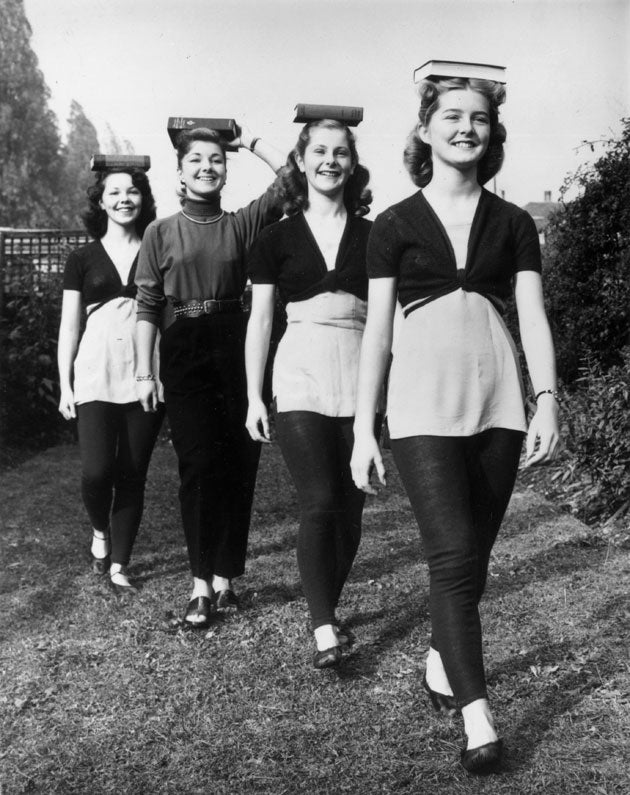Why can't a woman be more like a lady?
'Feminine values' are making a comeback but do they have any place in today's world?

The eternal question of what makes a woman a lady has reared its well-coiffed head once again this summer thanks to a raft of new experts queuing up – politely, of course – to tell British women to polish their shoes, mind their p's and q's, and generally be a little more ladylike.
While for many the very idea of ladylike behaviour is outdated, or even risible – as illustrated by the memorable Little Britain sketches in which David Walliams cries: "I am a Laydee" – a controversial book poised to hit UK bookshops next month is seeking to rescue the term from ridicule, advocating a "return to feminine values". This may not be entirely fanciful.
At the same time, sales of the conservative magazine The Lady are soaring, and Miss Debrett, the etiquette authority's new online agony aunt, is offering women a helping hand on everything from weddings to email etiquette.
In her book How to Be a Hepburn in a Hilton World, Jordan Christy laments the rise of the "stupid girls", represented in the public eye by such celebrities as Paris Hilton and Lindsay Lohan, declaring our "current female landscape as "embarrassing, flippant and shallow".
According to Ms Christy, a Christian from Nashville, Tennessee, who advises on everything from style to careers and relationships, women should be "tactful, well-spoken, cute but modest; the most intelligent version of ourselves". No pressure there, then, girls.
While the book is aimed squarely at teenagers and twenty-somethings, it is not just youngsters who are trying to work out what it means to be a lady – a word that for many remains unambiguously a compliment – in 2009. Sales of The Lady, the average age of whose readers is an impressive 78, were up 9.1 per cent in the first half of this year on the second half of 2008. The growing popularity of one of Britain's oldest weekly titles follows attempts to shake off its fusty image, a move likely to be hurried by the appointment of the author and columnist Rachel Johnson as its new editor.
This revival of interest in ladylike behaviour is also being played out on TV, with 2.6 million viewers tuning in to the final episode of the most recent series of Ladette to Lady, the show that sees wild young women sent to finishing school.
While the manners, social graces and appropriate clothing espoused by these arbiters of "style and grace" can be empowering, enabling women to move between different situations with ease, some believe the advice they offer is restrictive and sexist.
"I find the very term 'lady' offensive," said Ellie Levenson, author of The Noughtie Girl's Guide to Feminism. "It suggests that women have to conform to an outdated gender stereotyping in order to be treated with respect."
While How to be a Hepburn in a Hilton World stresses that it is important for women to have self-respect, some of its advice jars with feminists. Tips such as wearing a knee-length skirt and not drinking too much sit alongside a chapter entitled "Let Him Come Callin'", which reads like an updated version of The Rules, the 1995 book that advised women to play elaborate games to encourage men to propose marriage.
"Being a 'lady' seems to involve not being too opinionated, not having too much personality, and not being sexually forward," said Ms Levenson. "It is not what I want, and it is not what the men I know want either. Not that it would matter if it was."
Ms Christy disagrees, arguing it is the wild behaviour displayed by some celebrities and the young women who look up to them – such as drinking heavily and going out without underwear – that is anti-feminist.
"Females have made great advances in the world, but sometimes I feel like we are trampling on all the hard work of the women who came before us with our stiletto heels," she said.
While the arguments rage, the demand for enlightenment on etiquette remains strong, according Jo Bryant of Debrett's. "When we launched Debretts.com, we wanted a new, modern way to talk about etiquette. Manners are about how you interact with people, so of course they matter. Etiquette changes so much with technology; a couple of years ago we were talking about mobile phones, and now we are on to dealing with Facebook and Twitter.
"We have a mixed audience. We'd never tell people not to go out and get drunk. It's all about balance. There are people who can be too mannered, and it doesn't put people at ease. Until we published Etiquette for Girls in 2006, other guides didn't reflect a world in which women went to work."
Join our commenting forum
Join thought-provoking conversations, follow other Independent readers and see their replies
Comments
Bookmark popover
Removed from bookmarks